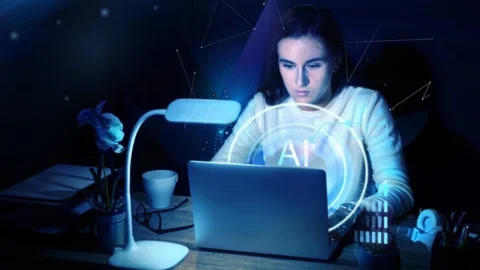Artificial Intelligence (AI) has made impressive strides over the last decade, from driving cars to composing music and diagnosing diseases. With the rapid advancements, it’s no wonder that discussions about AI replacing humans in various aspects of life have intensified. But with these discussions come many myths, misunderstandings, and fears about the role of AI in our future.
In this blog, we’ll dissect some of the most common myths about AI and separate them from the realities. While AI is transforming how we live and work, it will unlikely ai replace humans in all aspects. Here’s a breakdown of the myths and the truths behind them.
Myth 1: AI Will Completely Replace Jobs
Reality: AI Will Transform Jobs, Not Eliminate Them
The idea that AI will wipe out entire industries and render millions of workers jobless is a popular myth. While it’s true that automation and AI are changing the landscape of the workforce, the reality is much more nuanced.
AI is likely to eliminate certain repetitive, dangerous, and mundane tasks. For example, jobs in assembly lines, basic data entry, and telemarketing could be significantly affected. However, AI is also creating new job opportunities, particularly in fields like AI development, machine learning, cybersecurity, and data science.
Moreover, AI is enhancing the capabilities of human workers. Instead of replacing people, AI is more likely to augment human roles by helping with tasks such as data analysis, decision-making, and creative processes. Human workers will increasingly partner with AI to deliver more efficient and insightful results. Roles requiring emotional intelligence, creativity, complex problem-solving, and leadership are unlikely to be replaced by machines in the foreseeable future.
Myth 2: AI Can Think Like Humans
Reality: AI Is Not Truly Sentient
A popular misconception is that AI can think and reason like humans. While AI has made significant progress in mimicking human behavior, it does not possess true consciousness, self-awareness, or understanding in the way humans do.
AI operates based on algorithms and data. It can process and analyze large volumes of information quickly, identify patterns, and even make predictions based on historical data. However, it lacks intuition, emotional intelligence, and moral judgment. AI does not “think” in the human sense; instead, it uses pre-programmed instructions and learned patterns to complete specific tasks.
The idea of AI being “sentient” or capable of independent thought is more of a science fiction concept than a reality. The field of AI known as Artificial General Intelligence (AGI) is still in its infancy, and the timeline for achieving AGI, where machines exhibit human-like cognition, is highly uncertain, if not far off.
Myth 3: AI Will Make Humans Obsolete
Reality: AI Will Complement Human Abilities, Not Replace Them
The notion that AI will render humans obsolete in all domains is an extreme and unfounded belief. While AI can outperform humans in specific tasks, particularly those that are rule-based or require processing vast amounts of data, humans possess unique qualities that machines cannot replicate.
Humans have emotional intelligence, creativity, empathy, and social skills qualities that make us effective in complex and dynamic situations. AI cannot replace the human touch in areas like healthcare, education, negotiation, and art. For example, a doctor may use AI to analyze medical imaging more accurately, but only a human doctor can provide the compassion and emotional support patients need during difficult times.
Furthermore, the creative process whether in music, literature, or innovation is deeply rooted in human experience and expression, areas where AI can assist but cannot replace the depth of human insight.
Myth 4: AI Will Lead to Unchecked Surveillance and Loss of Privacy
Reality: AI Can Be Controlled to Safeguard Privacy
With the rise of AI-powered surveillance tools, many people fear that AI will lead to widespread loss of privacy and become an invasive force in daily life. While there is certainly potential for misuse of AI in surveillance, the technology itself is not inherently evil. The key lies in how it is regulated and controlled.
AI systems that monitor people, such as facial recognition and tracking systems, can indeed pose privacy concerns if they are used without appropriate checks and balances. However, the solution to these challenges does not lie in abandoning AI; rather, it requires strong ethical guidelines, regulations, and transparency. Many countries are introducing laws to govern AI and protect privacy rights.
In the future, AI can also be used to enhance privacy. Techniques such as AI-powered encryption, data anonymization, and decentralized data storage are being explored to ensure that data remains secure and that individuals retain control over their personal information.
Myth 5: AI Will Always Make Better Decisions Than Humans
Reality: AI Decisions Are Only as Good as the Data It’s Given
Another myth is that AI can make decisions more efficiently and accurately than humans in every situation. In reality, AI is only as good as the data it processes. AI systems learn from historical data, which means that if the data is biased, incomplete, or flawed, the AI’s decisions will be too.
For instance, AI algorithms used in hiring processes have been found to perpetuate biases if they are trained on biased data. Similarly, AI used in criminal justice systems has been shown to reinforce racial biases.
Moreover, while AI can analyze data and detect patterns at impressive speeds, it lacks the human ability to apply context, ethics, and morals to decision-making. In fields like law, healthcare, and social policy, human judgment remains essential for making ethical and contextually appropriate decisions.
Myth 6: AI Will Be Autonomous and Uncontrollable
Reality: AI Can Be Made Safe and Governed
One of the most prominent fears is that AI will become so advanced and autonomous that humans will no longer be able to control it. This concern is often popularized by dystopian scenarios in movies, where AI systems rebel against their creators.
While this is an interesting concept in science fiction, it is far from the current reality. The development of AI is closely monitored by researchers, governments, and organizations that are dedicated to ensuring that AI systems are safe, ethical, and under human control.
Much of the research in AI today focuses on creating frameworks to ensure that AI behaves in predictable and transparent ways. Concepts like “explainable AI” and “AI ethics” are gaining traction to ensure that AI systems are designed in a manner that aligns with human values and can be controlled effectively.
The Future of AI and Humans
AI is a tool a powerful tool that can augment human capabilities, solve complex problems, and improve lives. But it will not replace humans in all aspects of life. The myths about AI often exaggerate its capabilities or ignore the fundamental differences between human intelligence and artificial systems.
The truth is that AI will change many industries, but rather than replacing humans, it will enhance our roles and help us work more efficiently. As long as we continue to prioritize ethics, regulation, and human oversight, AI can be a force for good in the world, enabling new opportunities and possibilities while preserving the value of human experience, creativity, and judgment. Ultimately, AI will be a partner not a replacement for human beings in the ever-evolving world.






